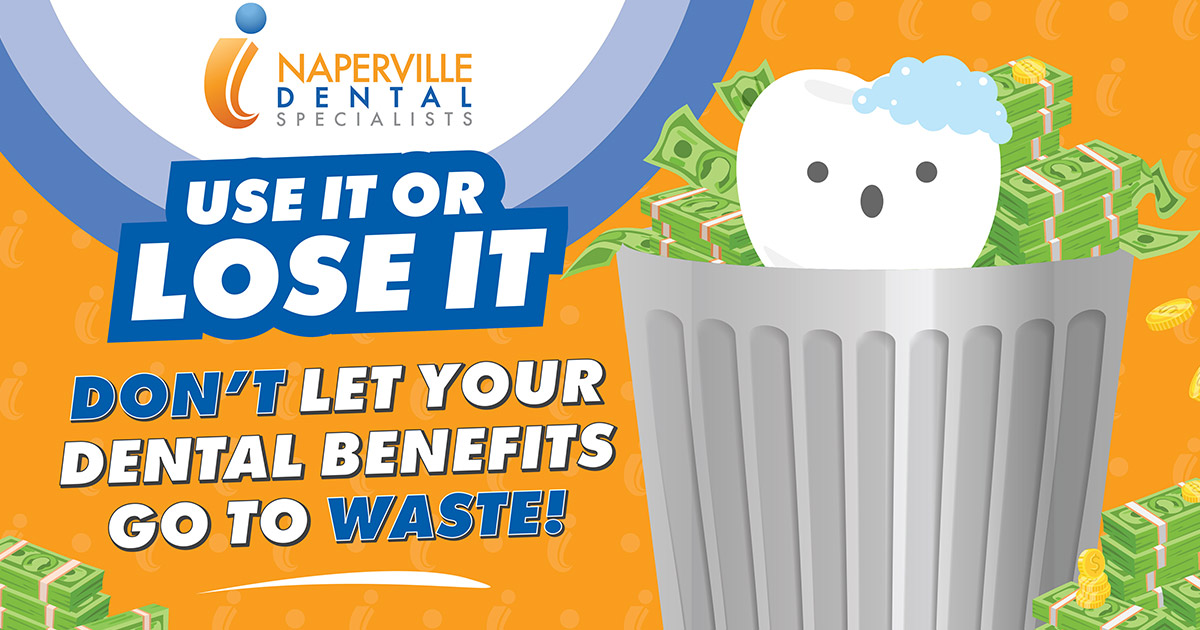
As the end of the year approaches, it’s the perfect time to review your dental benefits and Flexible Savings Account (FSA) or Health Spending Account (HSA) funds.
Many people don’t realize that unused dental benefits expire at the end of the year, as do funds in most FSAs, which means you’re leaving money on the table if you don’t use them. At Naperville Dental Specialists, we’re here to help you take full advantage of your benefits.
In this post, we’ll dive into how to get the most out of your dental insurance plan, how to use your HSA or FSA for dentist visits and answer common questions about dental coverage.
1. Understanding Your Dental Insurance Plan
Before you can fully maximize your benefits, it’s important to understand how your dental insurance plan works. Each plan is different but most cover preventive care, such as cleanings, exams and X-rays, at no extra cost. Preventive care is key to maintaining oral health, so it’s a great idea to schedule these visits before the year ends.
For more extensive treatments like fillings, crowns or root canals, your dental insurance plan will likely cover a percentage of the cost but this depends on your specific plan and whether you’ve met your deductible.
If you’re unsure, give your insurer a call or check your account online. This will help you figure out your out-of-pocket cost and plan your treatments accordingly.
2. What Does Annual Maximum Mean for Dental Insurance?
Another key concept is the annual maximum. So, what does annual maximum mean for dental insurance? Simply put, it’s the set maximum amount your dental insurance will pay out each year.
If you don’t use your full benefits by the end of the year, those funds are lost; they do not carry over. That’s why you’ll want to schedule any pending dental treatments before December 31.
For example, if your annual maximum is $1,500 and you’ve only used $800, you still have $700 of covered treatments you could use before the year ends.
3. When Does Dental Insurance Reset?
In most cases, dental insurance plans reset on January 1. That means your annual maximum, deductible and benefits start fresh for the new year. If you don’t use your remaining benefits before December 31, they expire, and you’ll miss out on potential savings.
4. Can an FSA/HSA Be Used for Dental Care?
Yes! You can use your FSA or HSA for dentist visits. In fact, many dental expenses qualify as long as they’re necessary for preventing or treating oral disease. This includes preventive care, fillings, crowns and even braces or Invisalign®.
If you have an FSA, generally, they have a “use it or lose it” policy. The funds must be used by the end of the calendar year or you risk forfeiting them. On the other hand, HSAs often roll over. If you’re planning to use your FSA for dentist visits or treatments, use up the funds now to maximize your savings.
To use your HSA or FSA at the dentist, pay for the expense with your HSA or FSA debit card or your own funds. If you use your personal funds, you may need to submit a claim for reimbursement along with any required documentation through your plan’s administrator. In either case, it’s important to save your receipt and, if you have insurance, your Explanation of Benefits (EOB).
5. What Does Dental Insurance Cover?
Dental insurance plans vary but most plans cover preventive services like cleaning and exams twice a year and x-rays once a year. Your plan also likely has partial coverage for restorations and other treatments, such as:
- Fillings
- Dental crowns
- Dental bridges
- Root canals
- Extractions
- Dental implants
- Periodontics
- Orthodontics, in some cases
At Naperville Dental Specialists, a team member will let you know what dental insurance does cover and what it doesn’t before you start treatment. You can also call your insurance provider for details, so you know exactly what you can put your remaining benefits towards.
Maximize Your Year-End Benefits
Now that you have a better understanding of your dental insurance plan and using your HSA/FSA for dentist visits, here are some actionable steps you can take to maximize your benefits before the end of the year:
- Schedule Preventive Care: If you haven’t had your second cleaning and exam of the year, book it now. Preventive care is usually covered 100% by insurance.
- Complete Pending Treatments: If your dentist has recommended a filling, crown, dental implant or other treatment, now is the time to get it done before your benefits reset.
- Use Your FSA Funds: Check your remaining FSA balance and schedule any dental work that qualifies before the end of the year. HSAs typically roll over, but it’s still a good idea to use available funds to save on dental care.
- Plan for Next Year: If you know you’ll need more extensive dental work in the new year, plan ahead by scheduling a consultation now. A Naperville dentist will provide you with a personalized treatment plan and cost breakdown. This will help you make the most of your new benefits when they reset.
Don’t Wait to Maximize Your Benefits!
Now that you know what dental insurance covers, when your benefits reset and whether plans roll over, don’t let your benefits go to waste. The end of the year is fast approaching, so now is the time to schedule a visit.
At Naperville Dental Specialists, we have general dentists and specialists under one roof and we file with most PPO insurances, making it easy to use your benefits and maintain outstanding oral health.
Book an appointment with an experienced Naperville dentist today! Or if you have any questions about your dental insurance coverage, call us at (630) 848-2010 and a friendly team member will be happy to help.
































